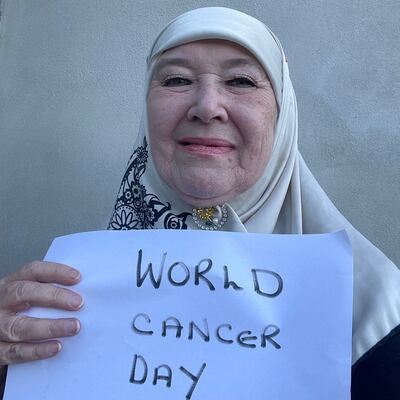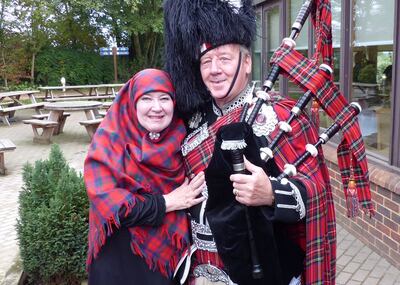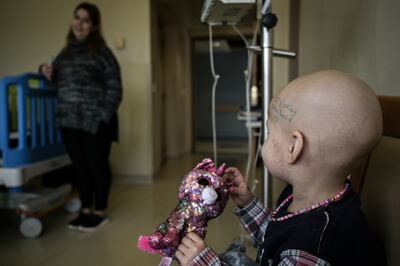As support communities and charities across the globe mark World Cancer Day on February 4, one brave British citizen who battled six types of the disease over 22 years said surviving is like “living with a sword above your head” because of the continued risk of yet another diagnosis.
Campaigners have launched a global drive to wipe out the "cancer care gap" between wealthy and developing nations, and also within national borders. They say by 2030 three quarters of premature cancer deaths will occur in low and middle-income countries.
During the Covid-19 pandemic, the lifeline offered to patients via cancer support groups disappeared as millions were confined to their homes during lockdowns.
British mother-of-one Helen Taskiran was among those who had her cancer support network pulled from under her feet.
'I’m living with a sword above my head'
Mrs Taskiran, 65, from Dartford in Kent, south-east England, fought off six types of cancer and will live with the side effects of chemotherapy and other treatments for the rest of her life. She is a survivor of cancer in her bowel, breasts, cervix, uterus, colon and skin.

The former accountant, who recently switched career to become a finance systems analyst, was born with a defective gene that puts her at high risk of the disease. Although she is cancer-free at the moment, there remains a high chance she will develop the illness again.
“You’re living with this sword above your head all the time and you don’t know when it’s going to drop,” she told The National. “My son is 33 and lives in Singapore and [being at risk of cancer] makes me stop and think whether I will get to see my [future] grandchildren.”
After relying on Macmillan, one of the UK’s largest cancer charities, for support during her years with the illness, Mrs Taskiran now devotes her free time to “giving back”. Drawing on her own harrowing experiences, she speaks to members of support groups who are living through their worst nightmare.
“It helps me to feel that there’s some good coming out of what I have been through,” she said. “If [sharing] my experiences can help somebody else cope with what they’re going through and let them know what to expect, it can only be a good thing.
“I always get told that I don’t look as if I have had six types of cancer.
“A lot of people think that once you’ve finished your chemotherapy treatment, that’s it, but you actually end up living with a lot of side effects. I have an ileostomy and a lot of people would find that hard to cope with. I get tired very easily and my concentration goes – that’s tied in with chemo.”
No backup during the pandemic
When the Covid-19 pandemic struck in spring 2020, Mrs Taskiran, like many others, was confined to her home and could not meet other cancer survivors and those going through treatment to offer them support. A year later, she had to undergo surgery in April 2021 for a hernia caused indirectly by cancer. When she was released from hospital, the magnitude of the strict Covid-19 regulations hit her with full force and she was left with no choice but to recover alone at home, without the support of family, friends or fellow cancer survivors.
“It was lonely,” she said. “My family could not come and visit me. I was trying to speak to people on video but it was very difficult because I was on my own. I had no back-up from the hospital.”
“It makes you appreciate more the people that you do have around you and to appreciate the small things like going to have a coffee, being able to have hugs and seeing someone in a garden – just being able to get out of the house and see friends.”
Ten months on, she still has not been given an appointment for a follow-up to her surgery, as the UK’s National Health Service grapples with a massive backlog caused by Covid.

Mrs Taskiran fears the effects of this could be felt for generations to come, particularly if cancer goes undiagnosed owing to a lack of care.
“A lot of the people I speak with in my support groups have not had routine check-ups,” she said. “They are worried sick that their cancers will come back.”
Closing the cancer gap
International campaigners have launched an ambitious bid to close the gap between the level of care on offer in rich nations and developing countries.
To coincide with World Cancer Day the Union for International Cancer Control is appealing for help to reduce the care gap, not just across countries, but within national borders as well.

The campaign calls on the cancer community, governments and healthcare providers to take action adapted to national needs and resources to reduce inequality and improve access to cancer services.
Given the current trajectory, the union said that by 2030, 75 per cent of premature cancer deaths will occur in low and middle-income countries. The World Health Organisation classes any death that occurs before the age of 50 as premature.
Anyone in need of cancer support can call the Macmillan Support Line and speak to specially trained nurses and other experts on 0808 808 00 00, seven days a week from 8am to 8pm, or visit Macmillan’s website or Online Community: macmillan.org.uk





